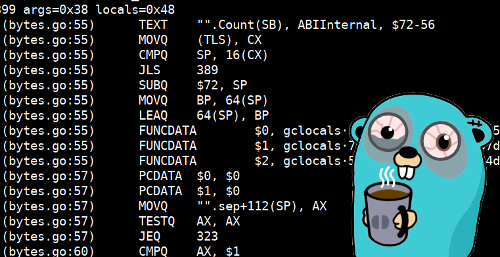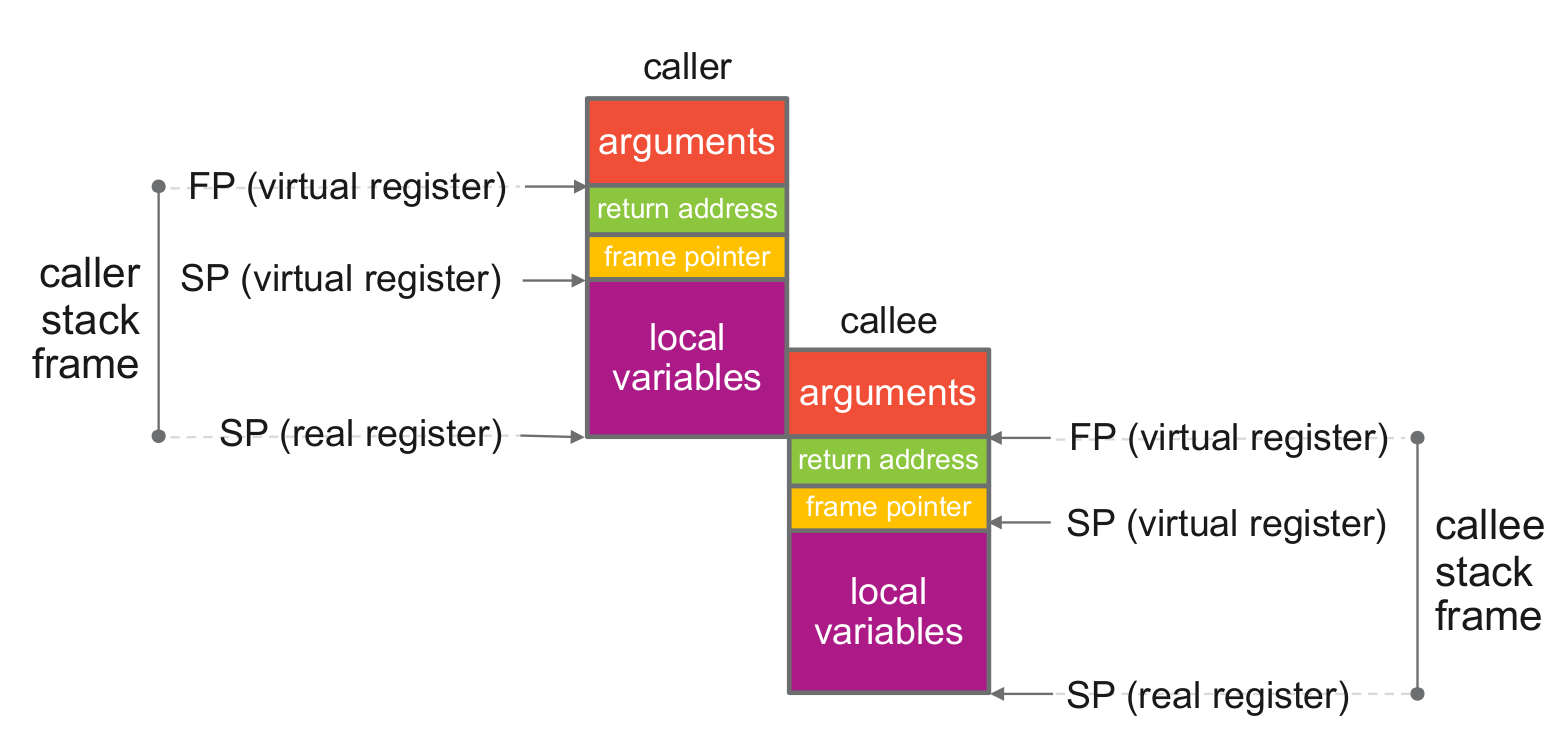Sie sind auf einen wirklich haarigen Bereich mit ASM-Code gestoßen.
Mein erster Vorschlag ist nicht, vom Assembler nach Go zu rufen. - Ian Lance Taylor
Solange Ihr Assembler-Code etwas Einfaches tut, sieht alles gut aus.
Sobald Sie die Aufgabe haben, eine Funktion aus dem Assembler-Code von Go aufzurufen, erhalten Sie einen der ersten Tipps: Tun Sie dies nicht.
Aber was ist, wenn Sie es wirklich wirklich brauchen? In diesem Fall bitte unter Katze.

Aufruf Konvention
Alles beginnt mit der Tatsache, dass Sie verstehen müssen, wie Argumente an Funktionen übergeben werden und wie die Ergebnisse akzeptiert werden .
Ich empfehle Ihnen, sich mit den Go-Funktionen in Assemblersprache vertraut zu machen , in denen die meisten benötigten Informationen klar beschrieben sind.
In der Regel variiert die Aufrufkonvention von Plattform zu Plattform, da der Satz verfügbarer Register variieren kann. Wir werden nur betrachten GOARCH=amd64, aber im Fall von Go unterscheiden sich die Konventionen nicht so signifikant.
Hier sind einige Funktionen der Funktionsaufrufkonvention in Go:
- Alle Argumente werden durch den Stapel geleitet, mit Ausnahme des "Kontexts" in den Abschlüssen, auf den über das Register
DX(% rdx) zugegriffen werden kann. - ( arguments).
- .
- . , .
, . .

, register-based calling convention. Go.
, :
- , .
0(SP), 8(SP) ( 8 ), .n(SP), n — . int64, 16(SP).
.
package main
func asmfunc(x int32) (int32, int32)
func gofunc(a1 int64, a2, a3 int32) (int32, int32) {
return int32(a1) + a2, int32(a1) + a3
}
func main() {
v1, v2 := asmfunc(10)
println(v1, v2)
}
// func asmfunc(x int32) (int32, int32)
TEXT ·asmfunc(SB), 0, $24-12
MOVL x+0(FP), AX
MOVQ $1, 0(SP) // (a1 int64)
MOVL $2, 8(SP) // (a2 int32)
MOVL AX, 12(SP) // (a3 int32)
CALL ·gofunc(SB)
MOVL 16(SP), AX //
MOVL 20(SP), CX //
MOVL AX, ret+8(FP) //
MOVL CX, ret+12(FP) //
RET
$24-16 (locals=24 bytes, args=16 bytes)
0 8 12 16 20 SP
locals=24 [a1:8][a2:4][a3:4][ret:4][ret:4]
(ret asmfunc, gofunc)
0 4 8 12 FP
args=16 [x:4][padding:4][ret:4][ret:4]
(ret main, asmfunc)
, 4 . , , (8 amd64).
, . — int32, — int64, offset 8, 4, reflect.TypeOf(int64(0)).Align() 8.
, FP go vet.
stackmap
-.
package foo
import (
"fmt"
"testing"
)
func foo(ptr *object)
type object struct {
x, y, z int64
}
func printPtr(ptr *object) {
fmt.Println(*ptr)
}
func TestFoo(t *testing.T) {
foo(&object{x: 11, y: 22, z: 33})
}
TEXT ·foo(SB), 0, $8-8
MOVQ ptr+0(FP), AX
MOVQ AX, 0(SP)
CALL ·printPtr(SB)
RET
, - stackmap:
=== RUN TestFoo
runtime: frame <censored> untyped locals 0xc00008ff38+0x8
fatal error: missing stackmap
, , GC stackmaps. Go , .
stub ( Go ). , stackmap , .
, stackmap (), NO_LOCAL_POINTERS ( ).
NO_LOCAL_POINTERS
TestFoo :
#include "funcdata.h"
TEXT ·foo(SB), 0, $8-8
NO_LOCAL_POINTERS
MOVQ ptr+0(FP), AX
MOVQ AX, 0(SP)
CALL ·printPtr(SB)
RET
, .
, ? , , "" , , , , ?
, heap, , . , , . GC "" , , .
, , "" (escapes to heap) escape analysis, , .
NO_LOCAL_POINTERS: , , , GC . .
Go non-cooperative preemption, , .
Go. , go:nosplit, , , NO_LOCAL_POINTERS .
GO_ARGS
, Go prototype, GO_ARGS.
GO_ARGS — funcdata.h, NO_LOCAL_POINTERS. , stackmap Go .
, stackmap . args_stackmap . : , stackmap.
GO_RESULTS_INITIALIZED
Go , ( ) GO_RESULTS_INITIALIZED .
:
// func getg() interface{}
TEXT ·getg(SB), NOSPLIT, $32-16
// .
// .
MOVQ $0, ret_type+0(FP)
MOVQ $0, ret_data+8(FP)
GO_RESULTS_INITIALIZED
// ...
RET
, , -.
GitHub.
Go JIT-
Go .
Garbage collector Go , , , , , Go JIT'.
, . , , .
calljit-v1
package main
import (
"log"
"reflect"
"syscall"
"unsafe"
)
func main() {
a := funcAddr(goFunc)
code := []byte{
0xb8, byte(a), byte(a >> 8), byte(a >> 16), byte(a >> 24),
0xff, 0xd0,
0xc3,
}
executable, err := mmapExecutable(len(code))
if err != nil {
log.Panicf("mmap: %v", err)
}
copy(executable, code)
calljit(&executable[0])
}
func calljit(code *byte)
func goFunc() {
println("called from JIT")
}
func mmapExecutable(length int) ([]byte, error) {
const prot = syscall.PROT_READ | syscall.PROT_WRITE | syscall.PROT_EXEC
const flags = syscall.MAP_PRIVATE | syscall.MAP_ANON
return mmapLinux(0, uintptr(length), prot, flags, 0, 0)
}
func mmapLinux(addr, length, prot, flags, fd, off uintptr) ([]byte, error) {
ptr, _, err := syscall.Syscall6(
syscall.SYS_MMAP,
addr, length, prot, flags, fd, offset)
if err != 0 {
return nil, err
}
slice := *(*[]byte)(unsafe.Pointer(&reflect.SliceHeader{
Data: ptr,
Len: int(length),
Cap: int(length),
}))
return slice, nil
}
func funcAddr(fn interface{}) uintptr {
type emptyInterface struct {
typ uintptr
value *uintptr
}
e := (*emptyInterface)(unsafe.Pointer(&fn))
return *e.value
}
// file jit_amd64.s
TEXT ·calljit(SB), 0, $0-8
MOVQ code+0(FP), AX
JMP AX
, ( ):
$ go build -o jit . && ./jit
called from JIT
goFunc, JIT-:
func goFunc() {
println("called from JIT")
+ runtime.GC()
}
:
$ go build -o jit . && ./jit
called from JIT
runtime: unexpected return pc for main.goFunc called from 0x7f9465f7c007
stack: frame={sp:0xc00008ced0, fp:0xc00008cef0} stack=[0xc00008c000,0xc00008d000)
000000c00008cdd0: 0000000000000000 00007f94681f7558
000000c00008cde0: 000000c000029270 000000000000000b
... (+ more)
: unexpected return pc for main.goFunc called from 0x7f9465f7c007, 0x7f9465f7c007 — JIT-. , runtime.
, , FP BP return address , .
Go runtime , JIT-, , .
calljit , , Go . , Go , , Go (calljit).
#include "funcdata.h"
TEXT ·calljit(SB), 0, $8-8
NO_LOCAL_POINTERS
MOVQ code+0(FP), AX
JMP AX
callgo:
CALL CX
JMP (SP)
:
- 8 , return address JIT .
NO_LOCAL_POINTERS - , CALL.
calljit , , , Go . , CX , [rsp] — , .
, callgo. , . main():
a := funcAddr(goFunc)
j := funcAddr(calljit) + 36
code := []byte{
0x48, 0xc7, 0xc1, byte(a), byte(a >> 8), byte(a >> 16), byte(a >> 24),
0x48, 0xc7, 0xc7, byte(j), byte(j >> 8), byte(j >> 16), byte(j >> 24),
0x48, 0x8d, 0x35, (4 + 2), 0, 0, 0,
0x48, 0x89, 0x34, 0x24,
0xff, 0xe7,
0x48, 0x83, 0xc4, (8 + 8),
0xc3,
}
CX, callgo DI, SI , [rsp]. 4+2 — LEAQ .
, , ADDQ. 8 8 BP.
calljit:
return address callgo
|
| Go BP
| |
0(SP) 8(SP) 16(SP) 24(SP)
[empty] [prevBP] [retaddr] [arg1:code]
| / | |
| / | calljit (caller frame)
| / |
| / CALL calljit
| /
calljit frame, 16 bytes
runtime.GC():
$ go build -o jit . && ./jit
called from JIT
Go . , — , .
, , . Go.
Go Internal ABI
Go Internal ABI — .
Go , , . ABI, , .
:
- .
- .
calling convention ABI0, ABIInternal.
Go -S, , ABIInternal , ABI0:

ABIInternal , ABI1, . ABIInternal calling convention .
, .
, Go . , .

Hub-
, . , , , . .